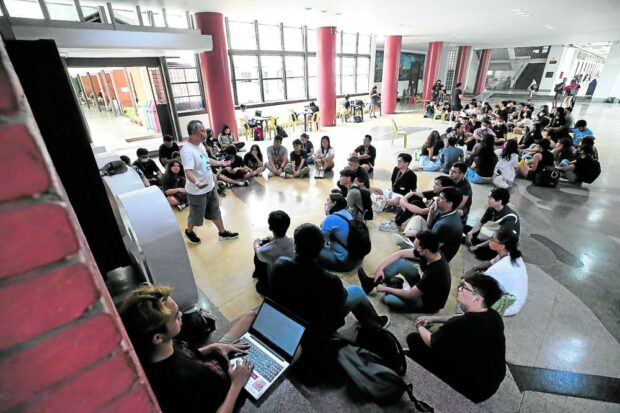
College students at the University of the Philippines (INQUIRER file photo)
MANILA, Philippines — A bill that will impose a moratorium on university and college students’ loans during calamities and other emergencies has been approved on second reading by the House of Representatives.
During the session on Tuesday, House Bill (HB) No. 9978 or the proposed Moratorium on Payment of Student Loan Act — a consolidation of three bills, namely HB Nos. 5462, 7279, and 7710 — was approved via viva voce or voice voting.
If enacted, the moratorium will be given to students enrolled in state universities and colleges, local universities and colleges, higher educational institutions, and technical-vocational institutions who reside in “barangays, municipalities, cities, provinces, or regions under a state of calamity or state of emergency, as may be declared by the President of the Republic of the Philippines or the concerned local sanggunian.”
“There shall be a moratorium on the payment of all fees, interests, and other charges on loans for higher education and TVET incurred by students enrolled in public or private HEIs and TVIs in relation to student loan programs administered by the HEIs or TVIs themselves or by the Unified Student Financial Assistance System for Tertiary Education Board, any other government agency or its instrumentality for the duration of a state of calamity, disaster, crisis situation, and other emergencies,” the bill stated.
“Provided that the availment of the moratorium shall not adversely affect the status of the concerned students with regard to their eligibility for re-enrollment on the succeeding semesters or terms, or their eligibility for graduation,” it further noted.
“Provided further that no penalties or interests shall be collected on the deferred payments made pursuant to this Act,” it added.
The bill also states that the availment of the moratorium shall not prevent public or private tertiary educational institutions from implementing more favorable forms of payment relief or assistance to students.
Crisis situations are defined as a “stressful situation, crucial time or state of affairs characterized by instability, breakdown or disruption in the usual or normal daily activities, especially one with the distinct possibility of a highly undesirable outcome.”
Meanwhile, the bill enumerates the following scenarios as a disaster:
A serious disruption of the functioning of a community or a society involving widespread human, material, economic or environmental losses and impacts, which exceeds the ability of the affected community or society to cope using its own resources;
The result of the combination of the following – exposure to a hazard; the conditions of vulnerability that are present; insufficient capacity or measures to reduce or cope with the potential negative consequences;
An event that causes loss of life, injury, disease and other negative effects on human, physical, mental and social well-being, together with damage to property, destruction of assets, loss of services, social and economic disruption and environmental degradation.
On March 17, 2023, Quezon City 1st District Representative Arjo Atayde said he filed HB No. 7279 to help families cope with emergencies and other pressing needs.
A similar bill was filed during the 18th Congress by Senator Lito Lapid, covering students under the same circumstances. But it failed to secure the approval of Congress due to time constraints.
READ: Lawmaker wants student loan payments suspended during calamities